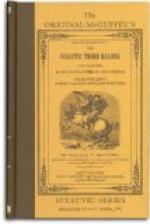Definitions.—l. Con’clave, a private meeting. 2. Man-a-ge’ri-al, of or pertaining to a manager. 4. De-duct’ing, taking away, subtracting. 5. Ca-reer’, course of action. 8. Au’di-ence, an assembly of hearers. 9. Ex-e-cu’tion, a putting to death by law. 10. In-junc’tion, a command. 11. At-trib’ut-ed, assigned, charged. Mael’strom (pro, mal’strum), a whirlpool.
Note.—The Revised Fifth Reader of this Series contains the portion of “William Tell” probably alluded to. See McGuffey’s Fifth Reader, pp. 207-216.
LXXVII. ALFRED THE GREAT. (217)
1. More than a thousand years ago, (in the year 849), a prince was born in England, who afterwards became one of the most celebrated and best loved kings in the world. His name was Alfred—afterwards called Alfred the Great—and he was the favorite son both of the king and queen.
2. In those days the common people were very ignorant; few of them could even read and write. There were no schools, and the monasteries, where almost the only teaching had been done, were nearly all destroyed in the wars which were continually going on. Only the higher classes had any chance to study, and even they paid much more attention to fighting than to studying.
3. But Alfred was different from most persons of his time. Even when a little boy, he delighted in listening to poems and to the ballads which harpers used to sing, and he learned many of them by heart. When he was twelve years old, his mother, the queen, offered to give a volume of poems to that one of her four sons who would first learn to read it. Alfred was the youngest of them all, yet he easily won the prize of which his brothers thought so little.
4. But, as has been said, these were stirring times, and Alfred was soon called on to show his great abilities as a soldier. The Danes, a warlike people, were continually swooping down in their vessels upon the coast of England. Often they spread over the entire country, plundering and burning the towns, and killing the people.
5. In the midst of these invasions Alfred became king, when he was only twenty-two years old. He proved as good a warrior as he was a student. He thought that whatever is worth doing at all is worth doing well. He was generally successful against the Danes, but at one time they seemed to have the country entirely in their power, and Alfred was compelled to hide for his life.
6. For some time he dressed as a peasant, and lived in the cottage of a cowherd, who was so careful of his king’s safety that he did not even tell his wife who he was. So she treated the king as a common peasant, and one day gave him a sharp scolding because he allowed some cakes to burn on the griddle, after she had left him to watch them. She told him he was clever enough at eating cakes though he managed so badly at baking them.
7. When the search for him grew less active, Alfred gradually collected some of his followers, with whom he encamped on a small spot of firm ground in the center of a bog. It was surrounded by almost impassable forests, and Alfred fortified the place so that it could not well be taken. Then he made frequent sudden and successful attacks on the enemy until his troops and the people became encouraged.




